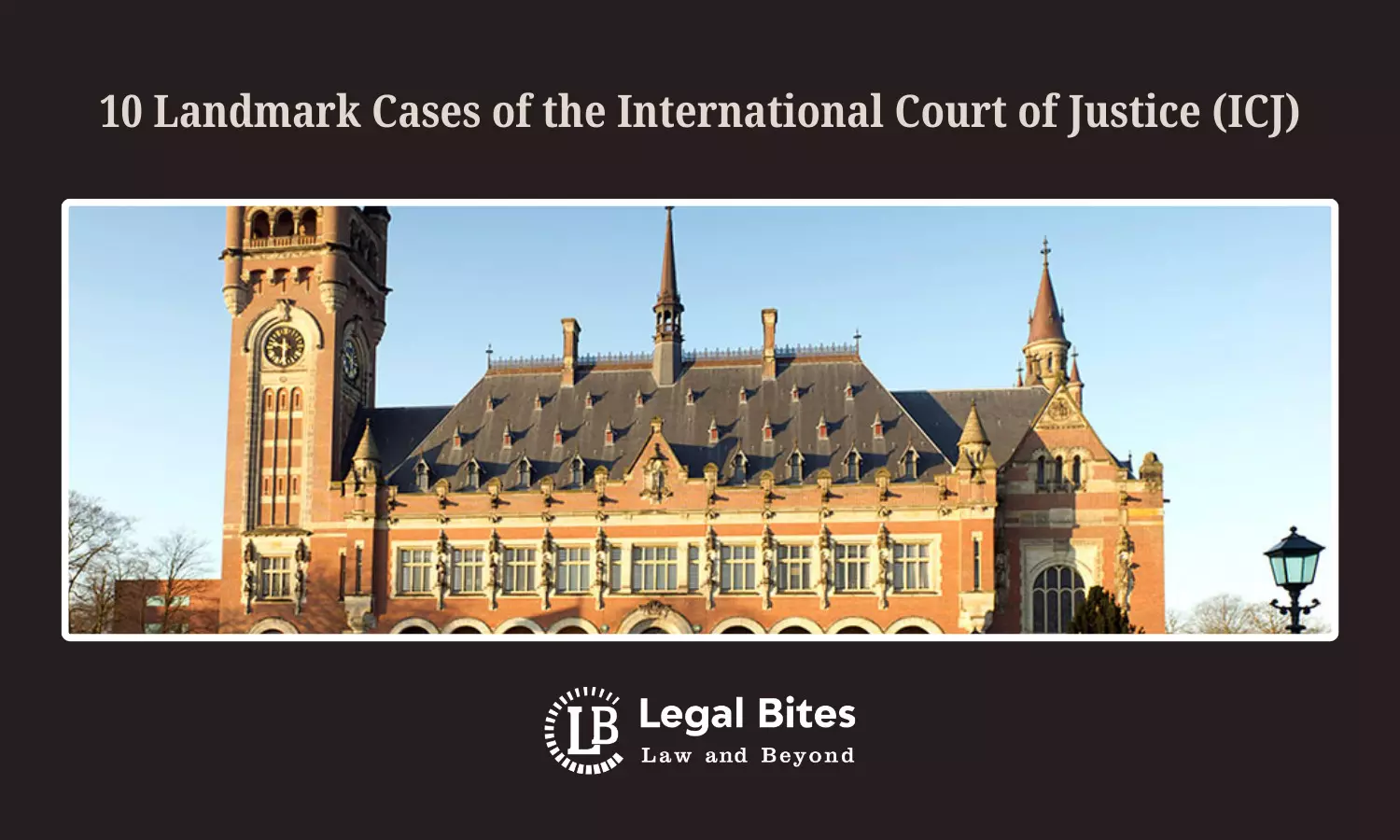10 Landmark Cases of the International Court of Justice (ICJ)
This article highlights ten landmark cases decided by the ICJ, providing a summary of each to illustrate the court's influence on the global legal order.

The International Court of Justice (ICJ), established in 1945, serves as the principal judicial organ of the United Nations. Its primary role is to resolve disputes between states by international law and to provide advisory opinions on legal questions referred to it by the United Nations and other international bodies. Over the years, the ICJ has significantly influenced the development of international law by adjudicating cases involving territorial disputes, human rights, environmental protection, and diplomatic immunity.
10 Landmark Cases of the International Court of Justice (ICJ)
1. Corfu Channel Case (United Kingdom v. Albania) [1949]
The Corfu Channel case concerned an incident in which British warships were damaged by mines in the Corfu Channel, an international waterway. The UK argued that Albania was responsible for the mining and failed to warn about the danger. The ICJ held that Albania was liable for the damages because it had knowledge of the mines but did not notify other states. This case established the principle that states have an obligation not to knowingly allow their territory to be used for harmful acts against other states.
Click Here to Read the Overview of the Case
2. Barcelona Traction Case (Belgium v. Spain) [1970]
Belgium claimed that Spain violated international law by expropriating the assets of Barcelona Traction, a company incorporated in Canada but with Belgian shareholders. The ICJ ruled that only Canada, as the state of incorporation, had standing to bring the case, not Belgium. This case clarified the principle of diplomatic protection and the rights of shareholders under international law.
Click Here to Read the Overview of the Case
3. Military and Paramilitary Activities in and against Nicaragua (Nicaragua v. United States) [1986]
Nicaragua alleged that the U.S. was supporting the Contras, a rebel group fighting the Nicaraguan government, and had mined Nicaraguan harbours. The ICJ ruled that the U.S. violated international law by using force and interfering in the internal affairs of Nicaragua. The case reaffirmed the prohibition on the use of force under the UN Charter.
Click Here to Read the Overview of the Case
4. East Timor Case (Portugal v. Australia) [1995]
Portugal challenged a treaty between Australia and Indonesia that exploited resources in the Timor Gap, arguing that it violated the right to self-determination of the East Timorese people. The ICJ ruled that it lacked jurisdiction because Indonesia was not a party to the case. This case reinforced the principle of self-determination as a fundamental right under international law.
Click Here to Read the Overview of the Case
5. Legality of the Threat or Use of Nuclear Weapons (Advisory Opinion) [1996]
The UN General Assembly requested an advisory opinion on whether the use or threat of nuclear weapons was permitted under international law. The ICJ ruled that while the use of nuclear weapons is generally contrary to international law, it left open the possibility of lawful use in extreme self-defence circumstances.
Click Here to Read the Overview of the Case
6. LaGrand Case (Germany v. United States) [2001]
Germany alleged that the U.S. violated the Vienna Convention on Consular Relations by not informing two German nationals of their right to consular assistance after their arrest. The ICJ ruled in favour of Germany, holding that the U.S. violated the treaty and that the right to consular notification creates individual rights enforceable under international law.
Click Here to Read the Overview of the Case
7. Avena Case (Mexico v. United States) [2004]
Mexico argued that the U.S. violated the Vienna Convention by not informing 54 Mexican nationals of their right to consular access after arrest. The ICJ ruled in favour of Mexico, affirming that the U.S. breached its obligations under the Vienna Convention and that the U.S. must review and reconsider the convictions.
Click Here to Read the Overview of the Case
8. Armed Activities on the Territory of the Congo (Democratic Republic of Congo v. Uganda) [2005]
The DRC alleged that Uganda engaged in acts of military aggression and human rights violations in its territory. The ICJ ruled that Uganda violated international law by engaging in military aggression and exploiting the natural resources of the DRC. It ordered Uganda to pay reparations for the damages caused.
Click Here to Read the Overview of the Case
9. Pulp Mills on the River Uruguay (Argentina v. Uruguay) [2010]
Argentina alleged that Uruguay violated a bilateral treaty by authorizing the construction of pulp mills on the River Uruguay without proper consultation. The ICJ ruled that Uruguay breached procedural obligations but found no evidence of environmental harm caused by the mills. The case underscored the importance of environmental protection and transboundary cooperation.
Click Here to Read the Overview of the Case
10. Whaling in the Antarctic (Australia v. Japan) [2014]
Australia challenged Japan's whale hunting program, arguing that it was not for scientific research but for commercial purposes, violating the International Convention for the Regulation of Whaling. The ICJ ruled that Japan’s program was not genuinely scientific and ordered it to cease the program. This case reinforced environmental conservation principles under international law.
Click Here to Read the Overview of the Case
References
- Corfu Channel Case (United Kingdom v. Albania), ICJ Reports 1949, p. 4.
- Barcelona Traction Case (Belgium v. Spain), ICJ Reports 1970, p. 3.
- Military and Paramilitary Activities in and against Nicaragua, ICJ Reports 1986, p. 14.
- East Timor Case (Portugal v. Australia), ICJ Reports 1995, p. 90.
- Legality of the Threat or Use of Nuclear Weapons, ICJ Reports 1996, p. 226.
- LaGrand Case (Germany v. United States), ICJ Reports 2001, p. 466.
- Avena Case (Mexico v. United States), ICJ Reports 2004, p. 12.
- Armed Activities on the Territory of the Congo, ICJ Reports 2005, p. 168.
- Pulp Mills on the River Uruguay, ICJ Reports 2010, p. 14.
- Whaling in the Antarctic, ICJ Reports 2014, p. 226.
Important Link
Law Library: Notes and Study Material for LLB, LLM, Judiciary, and Entrance Exams

